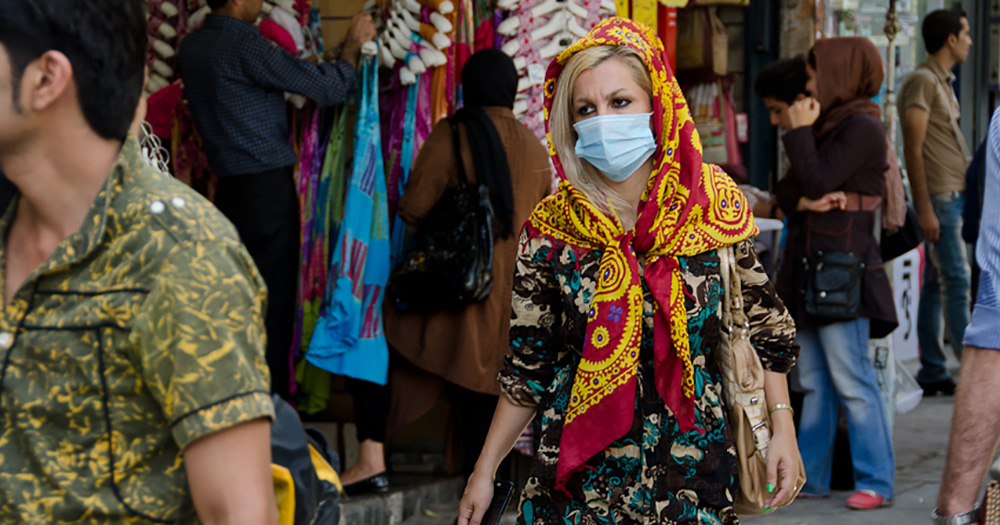Iran has reported the highest number of deaths from the novel coronavirus (Covid-19) outside of China, Chinese media Caixin Global reported.
The death toll in the Islamic Republic currently stands at eight, almost a fifth of the total number of confirmed cases, which stands at 43.
Time reported that while the outbreak has been concentrated in the city of Qom, it has since spread to four other cities, including the capital of Tehran.
Schools shut, football matches suspended, cinema events cancelled
Aljazeera further reported that Iranian authorities have since ordered the closure of schools, universities and cultural centres across 14 provinces, beginning on Feb. 23.
Additionally, all art and cinema events have been cancelled until the end of the week, while football matches have been suspended for 10 days.
The authorities have also implemented the daily sanitisation of Tehran's subway and public buses.
Iran's Supreme Leader blames "negative propaganda" on virus for low voter turnout
Separately, Iran's Supreme Leader, Ayatollah Ali Khamenei, has blamed "negative propaganda" on Covid-19 for a low voter turnout of 42 per cent at the country's parliamentary elections, Reuters reported.
This is the lowest rate since the Islamic Revolution in 1979.
As per Khamenei in a statement on his website:
"This negative propaganda about the virus began a couple of months ago and grew larger ahead of the election. Their media did not miss the tiniest opportunity for dissuading Iranian voters and resorting to the excuse of disease and the virus."
In a sermon on Fri, Feb. 21, he had called voting a "religious duty."
Iran's interior minister, Abdolreza Rahmani Fazli, has struck a different note however, the BBC reported.
He stated that the low voter turnout was "completely acceptable", given the Covid-19 outbreak, bad weather, recent protests and the shooting down of Ukrainian plane in Jan.
Public trust in the Iranian government is low
Both Aljazeera and the Financial Times reported that public trust in the government's management of the crisis is low, following the military's shooting down of the Ukrainian jet, which prompted protests by Iranians.
Currently, pharmacies in Tehran have reportedly run out of face masks and hand sanitisers, while questions have also been raised over why Iran only cut flights to China on Feb. 3, four days after the World Health Organisation (WHO) declared Covid-19 a global health emergency.
Time further reported that Iran's Health Ministry has stated that they are almost certain Covid-19 came to Qom from China.
The country's health minister, Saeed Namaki, stated that one of the deaths is a merchant who often travelled between the two countries using indirect flights, after direct flights to China were stopped.
However, no information was provided as to when the merchant returned from China, or the steps that were taken for those who had been in close contact with him.
Neighbouring countries close borders with Iran
In the meantime, several of Iran's neighbours such as Iraq, Turkey, Pakistan, Armenia and Afghanistan, have all closed their borders with Iran in a bid to halt the spread of the virus.
In a tweet, the Office of the National Security Council of Afghanistan stated it was suspending all land and air travel between the two countries so as to protect the Afghan public.
To prevent the spread of the novel #coronavirus and protect the public, Afghanistan suspends all passenger movement (air and ground) to and from Iran. The suspension also includes the import of poultry products (eggs and chicken) from Iran and Pakistan. #COVID19 pic.twitter.com/wfV5f5FaDD
— NSC Afghanistan (@NSCAfghan) February 23, 2020
Meanwhile, Iraq announced on Saturday, Feb. 22, that it was banning all arrivals from Iran, Aljazeera reported.
Although the period of the ban has not been specified, it is not expected to be a prolonged period of time, given the volume of goods that Iraq imports annually from Iran, and the number of Iranian religious pilgrims who enter the country on a monthly basis.
As for Turkey, the country's health minister, Fahrettin Koca, announced that it was shutting the land border with Iran.
He added that eight travellers from Iran have also been rejected from the Turkish border, since Feb. 21, when health checks were introduced at border crossings, Time further reported.
As for Pakistan, an official from the country's Balochistan province, which borders Iran, said that it had closed the border after Iran announced eight deaths from the virus.
Armenia's Prime Minister, Nikol Pashinyan, said that the country was suspending "communication" with Iran for two weeks to halt the virus.
This includes closing its border and halting air transport.
Top photo by Kamyar Adl via Flickr
If you like what you read, follow us on Facebook, Instagram, Twitter and Telegram to get the latest updates.
